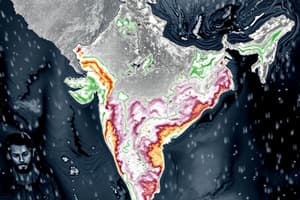Podcast
Questions and Answers
In which month does the mercury begin to fall rapidly in northern India according to the text?
In which month does the mercury begin to fall rapidly in northern India according to the text?
- October (correct)
- December
- September
- November
What is the latitude of Chennai?
What is the latitude of Chennai?
- 19° N
- 13°4' N (correct)
- 21°9' N
- 24°34' N
Which city has the highest average annual rainfall?
Which city has the highest average annual rainfall?
- Shillong (correct)
- Jodhpur
- Mumbai
- Kolkata
What is the average temperature of Delhi?
What is the average temperature of Delhi?
In which city do we have missing temperature data?
In which city do we have missing temperature data?
Which city is closest to the Equator based on latitude?
Which city is closest to the Equator based on latitude?
Which city has the lowest average annual rainfall?
Which city has the lowest average annual rainfall?
What is the difference between weather and climate?
What is the difference between weather and climate?
How are weather and climate related?
How are weather and climate related?
Why is the term monsoon derived from the Arabic word 'mausim'?
Why is the term monsoon derived from the Arabic word 'mausim'?
Which atmospheric element is not part of both weather and climate?
Which atmospheric element is not part of both weather and climate?
Which region receives the highest average rainfall in the world?
Which region receives the highest average rainfall in the world?
How is a year usually divided based on atmospheric conditions?
How is a year usually divided based on atmospheric conditions?
What phenomenon is associated with the tendency of the monsoon to have breaks in rainfall?
What phenomenon is associated with the tendency of the monsoon to have breaks in rainfall?
Why do we experience different seasons throughout the year?
Why do we experience different seasons throughout the year?
In which direction does rainfall in the Ganga valley decrease?
In which direction does rainfall in the Ganga valley decrease?
What happens when the axis of the monsoon trough lies over the plains?
What happens when the axis of the monsoon trough lies over the plains?
Which area receives some amount of rain despite being in a rain shadow area?
Which area receives some amount of rain despite being in a rain shadow area?
What is a characteristic of monsoon rains described in the text?
What is a characteristic of monsoon rains described in the text?
Why are Thiruvananthapuram and Shillong rainier in June than in July?
Why are Thiruvananthapuram and Shillong rainier in June than in July?
Why is July rainier in Mumbai than in Thiruvananthapuram?
Why is July rainier in Mumbai than in Thiruvananthapuram?
Why are southwest monsoons less rainy in Chennai?
Why are southwest monsoons less rainy in Chennai?
Why is Shillong rainier than Kolkata?
Why is Shillong rainier than Kolkata?
Why does Delhi receive more rain than Jodhpur?
Why does Delhi receive more rain than Jodhpur?
Why does Thiruvananthapuram have an equable climate?
Why does Thiruvananthapuram have an equable climate?
Flashcards are hidden until you start studying
Study Notes
Climate of India
- Climate refers to the sum total of weather conditions and variations over a large area for a long period of time (more than thirty years).
- Weather refers to the state of the atmosphere over an area at any point of time.
Elements of Weather and Climate
- The elements of weather and climate are the same, i.e.:
- Temperature
- Atmospheric pressure
- Wind
- Humidity
- Precipitation
Monsoon Climate
- The word monsoon is derived from the Arabic word ‘mausim’ which literally means season.
- Early in the season, the windward side of the Western Ghats receives very heavy rainfall, more than 250 cm.
- The Deccan Plateau and parts of Madhya Pradesh also receive some amount of rain in spite of lying in the rain shadow area.
- The maximum rainfall of this season is received in the north-eastern part of the country.
- Mawsynram in the southern ranges of the Khasi Hills receives the highest average rainfall in the world.
Characteristics of Monsoon
- The monsoon rains take place only for a few days at a time.
- They are interspersed with rainless intervals.
- These breaks in monsoon are related to the movement of the monsoon trough.
- When the axis of the monsoon trough lies over the plains, rainfall is good in these parts.
- Whenever the axis shifts closer to the Himalayas, there are longer dry spells in the plains, and widespread rain occur in the mountainous catchment areas of the Himalayan rivers.
Temperature Patterns
- Day temperatures are high, nights are cool and pleasant during the monsoon season.
- The land is still moist.
- Owing to the conditions of high temperature and humidity, the weather becomes rather oppressive during the day, commonly known as ‘October heat’.
- In the second half of October, the mercury begins to fall rapidly in northern India.
Regional Variations
- The Himalayas protect the subcontinent from extremely cold winds from central Asia, enabling northern India to have uniformly higher temperatures compared to other areas on the same latitudes.
- The Peninsular plateau, under the influence of the sea from three sides, has moderate temperatures.
- Despite such moderating influences, there are great variations in the temperature conditions.
- Annual rainfall and temperature variations are different in different cities like Bengaluru, Mumbai, Kolkata, Delhi, Jodhpur, Chennai, Nagpur, Shillong, Thiruvananthapuram, and Leh.
Studying That Suits You
Use AI to generate personalized quizzes and flashcards to suit your learning preferences.




